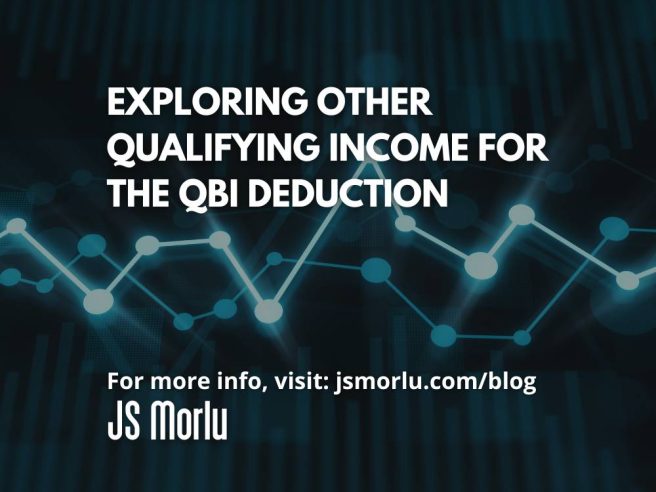By: John S. Morlu II, CPA
The Qualified Business Income (QBI) deduction under Section 199A offers eligible taxpayers the chance to deduct up to 20% of their qualified income. While QBI generally focuses on operating income from a trade or business, certain other types of income also qualify. However, strict rules determine what is included, excluded, and adjusted in the calculation. Let’s dive into the details and break it down step by step.
Other Types of Qualifying Income
In addition to operating income from a qualified trade or business, the following income types may qualify for the QBI deduction:
1. Qualified REIT Dividends
- What It Is: Dividends received from a Real Estate Investment Trust (REIT) that are not capital gain dividends or qualified dividends eligible for reduced tax rates.
- Why It Matters: These dividends are treated separately from typical investment income and can be included in the QBI calculation, offering additional tax savings for investors in REITs.
2. Qualified Publicly Traded Partnership (PTP) Income
- What It Is: Income from a Publicly Traded Partnership (PTP) that is not treated as a corporation. This includes:
o The taxpayer’s share of income and loss from the PTP.
o Gains from selling a partnership interest, as long as those gains are not treated as capital gains. - Why It Matters: PTP income can be significant for taxpayers invested in partnerships operating in industries like energy or real estate.
3. Qualified Cooperative Dividends
- What It Is: Dividends received from a cooperative that meet the definition of patronage dividends under Section 1388(a).
- Why It Matters: This type of income allows agricultural producers and other cooperative members to benefit from the QBI deduction.
Requirements for Income to Qualify
For income, gains, deductions, and losses to qualify for the QBI deduction, they must meet these criteria:
1. Be from a Domestic Business
- What It Means: The trade or business must operate within the United States.
- Special Case for Puerto Rico: Income from sources in Puerto Rico qualifies if it is subject to U.S. individual income tax rates.
2. Be Connected to Trade or Business Activity
- Income must be effectively connected to the conduct of a trade or business. This excludes income that originates from investments or passive activities.
Nonqualifying Investment Income
Certain types of investment income are specifically excluded from QBI. These include:
| Excluded Items | Examples |
| Capital Gains and Losses | Short-term or long-term capital gains or losses. |
| Dividend Income | Regular dividends, equivalent dividends, or payments in lieu of dividends. |
| Interest Income | Unless it is allocable to a trade or business. |
| Commodities Gains/Losses | Except those tied to normal trade or business activities. |
| Foreign Currency Gains/Losses | Unless related to the business needs. |
| Annuities | Unless used directly in the trade or business. |
| Income from Notional Principal Contracts | Unless it’s part of clearly identified hedging transactions. |
Simplified Explanation:
QBI primarily focuses on operating income—the income a business generates from selling its products or services. Investment income, such as capital gains or dividends, is excluded from the calculation.
Compensation Exclusions from QBI
Certain forms of compensation are also excluded from QBI. These include:
| Compensation Type | Explanation |
| Employee Wages and Salaries | Wages or salaries paid to employees are not included in QBI. |
| S Corporation Shareholder Compensation | Payments treated as reasonable compensation to S corporation shareholders. |
| Partnership Guaranteed Payments | Payments to partners for services rendered are excluded. |
| Section 707(a) Payments | Payments to a partner acting in a non-partner capacity. |
Impact on QBI Calculation:
These excluded compensation items reduce the amount of QBI passed through to the owner. For example, if an S corporation pays $20,000 in wages to an owner, the QBI passed through to the owner will be reduced by $20,000.
Example: How Compensation Affects QBI
Scenario:
A partnership generates $100,000 in net income. It pays one partner $30,000 as a guaranteed payment for services rendered.
| Step | Calculation | Result |
| Total Business Income | $100,000 | |
| Less: Guaranteed Payment | $100,000 – $30,000 | $70,000 (QBI) |
| QBI Deduction | $70,000 × 20% | $14,000 |
- Key Takeaway: Compensation reduces the QBI base, which directly impacts the deduction amount.
Summary: Focus on Operating Income
Section 199A focuses on operating income, the revenue generated by a business’s core activities. The exclusion of investment income and certain compensation ensures that the deduction remains tied to business operations rather than passive gains.
Key Takeaways
1. What Qualifies:
- Qualified REIT dividends, PTP income, and cooperative dividends can be included in QBI if they meet specific requirements.
- Operating income from a U.S.-based trade or business is the primary focus of the QBI deduction.
2. What Doesn’t Qualify:
- Investment income, capital gains, and most forms of compensation are excluded.
- Passive or hobby income does not qualify.
3. Practical Implications:
- Compensation and guaranteed payments reduce QBI and lower the deduction.
- The deduction encourages business activity by focusing on operating income rather than investment returns.
Author: John S. Morlu II, CPA
John S. Morlu II, CPA, is the CEO and Chief Strategist of JS Morlu, a globally acclaimed public accounting and management consulting powerhouse. With his visionary leadership, JS Morlu has redefined industries, pioneering cutting-edge technologies across B2B, B2C, P2P, and B2G landscapes.
The firm’s groundbreaking innovations include:
• ReckSoft (www.ReckSoft.com): AI-driven reconciliation software revolutionizing financial accuracy and efficiency.
• FinovatePro (www.FinovatePro.com): Advanced cloud accounting solutions empowering businesses to thrive in the digital age.
• Fixaars (www.fixaars.com): A global handyman platform reshaping service delivery and setting new benchmarks in convenience and reliability.
Under his strategic vision, JS Morlu continues to set the gold standard for technological excellence, efficiency, and transformative solutions.
JS Morlu LLC is a top-tier accounting firm based in Woodbridge, Virginia, with a team of highly experienced and qualified CPAs and business advisors. We are dedicated to providing comprehensive accounting, tax, and business advisory services to clients throughout the Washington, D.C. Metro Area and the surrounding regions. With over a decade of experience, we have cultivated a deep understanding of our clients’ needs and aspirations. We recognize that our clients seek more than just value-added accounting services; they seek a trusted partner who can guide them towards achieving their business goals and personal financial well-being.
Talk to us || What our clients says about us




